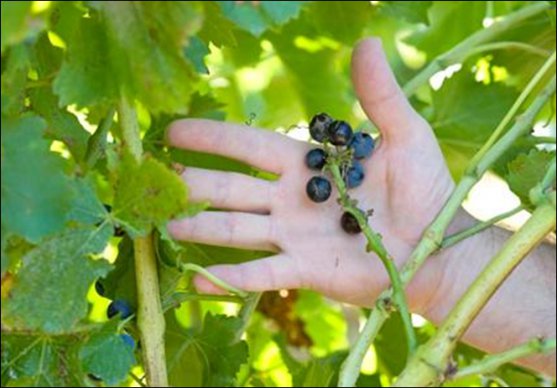
In 10 years, the average yield of the Côtes du Rhône has decreased by nearly 10 hl/ha (which corresponds to a volume decrease of nearly 25% between 2004 and 2014).
This decrease - mainly caused by global warming and by certain choices taken by the winemakers – undermines numerous farms. In order to stop this phenomenon, the only possible solution seems to be the total reorganisation of the vineyard.
The global warming led to:
- A temperature increase of about 1.1° in the Rhône Valley and overall less rainfall in the spring and summer which are periods when the vineyard needs water to grow under the best conditions,
- An increase of climate-related incidents: winter frost in 2012 and the coulure (failure of plant to bloom) in 2013 led to a 30% yield difference between a “normal” volume (2011) and a “disastrous” volume (2013),
- A recurrence of wood diseases due to an outbreak of new carriers - absent from this area up until now - and for which we presently don’t have the sufficient means to eradicate.
Winemakers also have a collective part of the blame for this yield decrease. Often acting along the lines of the leitmotiv “quality comes from small yields”, and in order to also try maintaining the profit of their estate, they made a choice in terms of investment and vineyard management which merely accentuated this phenomenon:
- Reduction of employees,
- Deferring the replacement of missing/dead plants,
- Suppression of certain ground work.
In order to slow down this volume decrease, the profession has become more aware of the importance of reorganizing the vineyard:
- Replacing missing plants or uprooting if the number of missing plants exceeds 40%,
- Choosing a suitable plant/grape variety – there is an increasing trend for cloning the most productive and resistant grapes against harsh weather conditions and/or diseases,
- Optimization of vineyard management: competent pruning (as this will determine the following harvest yield), checking of grass cover so as to not have the vines in competition, especially in the summer, and last but not least, monitored ground fertilization.
We all hope that if these measures are taken, we’ll be able to sustainably maintain our position of the largest wine-making country in the world (and not just wine, quality wine).
For more informations on Rhone wines : www.vins-rhone.com
Published : 2015-01-14

